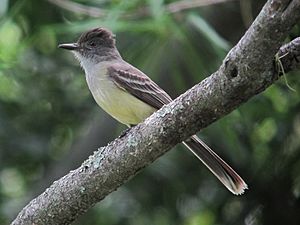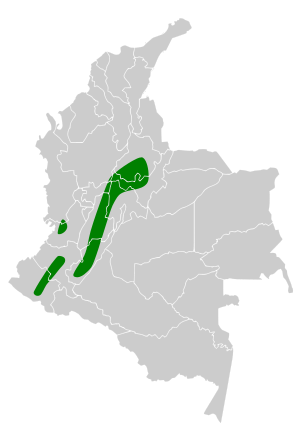Apical flycatcher facts for kids
Quick facts for kids Apical flycatcher |
|
|---|---|
 |
|
| Conservation status | |
| Scientific classification |
|
| Kingdom: | Animalia |
| Phylum: | Chordata |
| Class: | Aves |
| Order: | Passeriformes |
| Family: | Tyrannidae |
| Genus: | Myiarchus |
| Species: |
M. apicalis
|
| Binomial name | |
| Myiarchus apicalis Sclater, PL & Salvin, 1881
|
|
 |
|
| Script error: The function "autoWithCaption" does not exist. | |
Script error: No such module "Check for conflicting parameters".
The apical flycatcher (Myiarchus apicalis) is a cool little bird that lives only in Colombia, a country in South America. It's part of a bird family called Tyrannidae, which includes many types of flycatchers. These birds love to live in dry forests and open areas where it's sunny and warm.
Contents
What's in a Name? The Apical Flycatcher's Family Tree
This bird was first described in 1881 by an English animal expert named Philip Sclater.
- The first part of its scientific name, Myiarchus, comes from ancient Greek words. Muia means "fly," and arkhos means "ruler" or "chief." So, it's like the "chief of flies" – a perfect name for a bird that catches flies!
- The second part, apicalis, is Latin for "of the point or tip." This refers to the special white tips on its tail feathers, which help tell it apart from other similar birds.
This bird is "monotypic," which means it doesn't have any different types or "subspecies" that are officially recognized. It's just one unique kind of apical flycatcher!
Meet the Apical Flycatcher: What Does It Look Like?
The apical flycatcher is a medium-sized bird, usually about 18 to 19 centimeters (about 7.5 inches) long. It's quite slim and looks a lot like other birds in the Myiarchus group.
- Its back and upper parts are a grayish-olive color.
- Its wings are dark, but they have faint white edges on some feathers, which look like two light bars across its wings.
- The top of its head is a brownish-olive.
- Its throat and chest are a pale gray.
- The rest of its underside is mostly a pale yellow.
- The tail is dark, with a grayish-olive color underneath.
- The most special feature is the white tips on its tail feathers. This is a great way to tell it apart from other similar flycatchers in the area!
Both male and female apical flycatchers look exactly the same. Young birds, called juveniles, have reddish-brown edges on their wing feathers.
Where Does the Apical Flycatcher Live?
The apical flycatcher lives in the tropical and temperate parts of Colombia. You can find them at lower altitudes, starting from about 400 meters (about 1,300 feet) above sea level. Some experts say they can live as high as 1,700 to 2,500 meters (about 5,600 to 8,200 feet) up in the mountains!
These birds are often seen in:
- Dry forests
- Arid (very dry) and semi-arid open areas
- Savannas (grassy plains with scattered trees)
- Fields that have some trees or light woodlands
They are especially common in the upper parts of the Magdalena River, the Cauca River, and the Patiá and Dagua Rivers.
See also
 In Spanish: Copetón apical para niños
In Spanish: Copetón apical para niños
 | George Robert Carruthers |
 | Patricia Bath |
 | Jan Ernst Matzeliger |
 | Alexander Miles |


